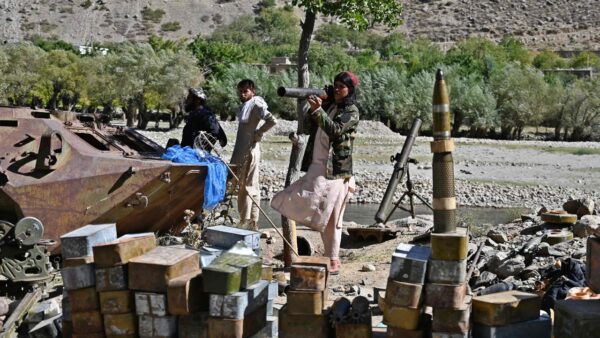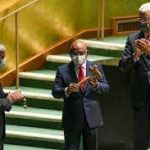An old man within the Panjshir Valley sadly describes the last stand resistance fighters made against the Taliban’s relentless sweep of Afghanistan: “There were too many of them.”
Leaning against the door of a company within the village of Khenj, Abdul Wajeed said the group’s forces massed in September at the mouth of the valley, north of the capital Kabul.
The sight of dozens of armoured Taliban vehicles powering through the narrow gorge is burned into his memory.
“There was nothing more we could do,” he said.
For three days his village and therefore the National Resistance Forces (NRF) — a mixture of Panjshiri fighters and remnants of the defeated national army — had fired “with heavy weapons” from the rugged cliffs above the valley.
The charred and twisted wrecks of quite a dozen Taliban vehicles are testimony to their intense struggle.
But the hardline Islamists continued their relentless advance, emboldened by sweeping victories across the remainder of the country and armed with a huge weapons arsenal seized from the Afghan army.
We were surprised, we didn’t know what to try to to ,” said one NRF fighter, who remains hidden in Panjshir. “We didn’t have enough weapons.”
In Malaspa, a farming village surrounded by lush fields, 67-year-old Khol Mohammad said the Islamists convoy had been so large it appeared like “a thousand vehicles filled with Taliban” had swept in.
Panjshir fighters earned a legendary reputation for resistance, defending their mountain homes first from the Soviet military for a decade, throughout the subsequent war , and against the primary Taliban regime from 1996-2001.
The 115-kilometre (70-mile) valley surrounded by jagged snow-capped peaks offers defenders a natural advantage.
But 20 years since the late veteran fighter Ahmad Shah Massoud led the Panjshiris to victory, the province is not any longer as isolated.
On August 30 the Taliban launched a multi-pronged offensive — with some residents claiming the Panjshiri fighters were outnumbered three-to-one.
– Vintage rifles –
Many of the Panjshiri guns were decades old, Taliban commander Mullah Sanaullah Sangin Fatih told AFP, as he showed off an enormous cache of weapons and rockets he said was abandoned as resistance fighters fled.
“It dates mainly from the time of the Soviet occupation,” Fatih said.
That stands in stark contrast to the fashionable arsenal the Taliban had at their disposal.
One Panjshiri fighter said the Islamists used a drone, “which enabled them to simply locate and bomb our positions”.
Multiple witnesses reported aerial bombardments, but it had been not clear who carried them out.
Some in Panjshir accuse neighbouring Pakistan of air strikes against them, claims Islamabad has rejected outright.
Others criticise the shortage of leadership, saying that the 32-year-old Ahmad Massoud — the son of the legendary fighter — lacked both experience and international backing.
The other leader, ex-vice president Amrullah Saleh, did little to galvanise support.
“When he came in August to turn people to fight with him, the elders criticised him for never having done anything for Panjshir,” an area journalist said.
It is unclear what remains of the resistance, and whether its leaders are even still within the country.
– Calm, for now –
On September 6, the Taliban seized the Panjshir’s capital of Bazarak and raised their white banner.
Today, the valley appears calm, with Taliban rule going “well”, consistent with several residents interviewed by AFP.
As a symbol of respect, the group have repaired the tomb of Ahmad Shah Massoud, which a number of their fighters damaged once they seized Bazark.
They say they need to bring “peace and security” to Panjshir, while continuing to seek out remaining resistance fighters.
But Khair Mohammad, an elder from Peshjrur village, said it reminded him of the Soviet occupation.
“It was precisely the same. They came, they told us at the start that we might be friends, and that we said yes in fact ,” he said with a smile.



